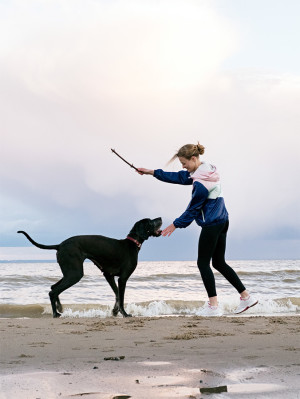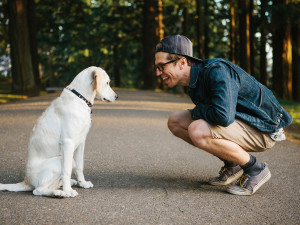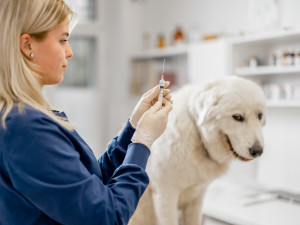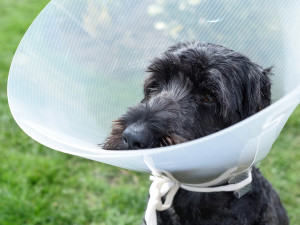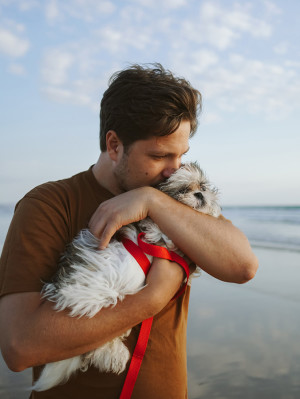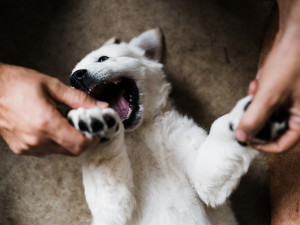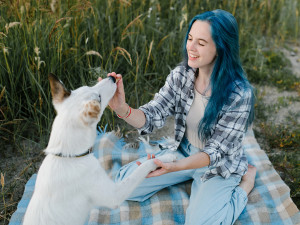When Can a Puppy Get a Rabies Shot?
And what you should expect after they receive it.
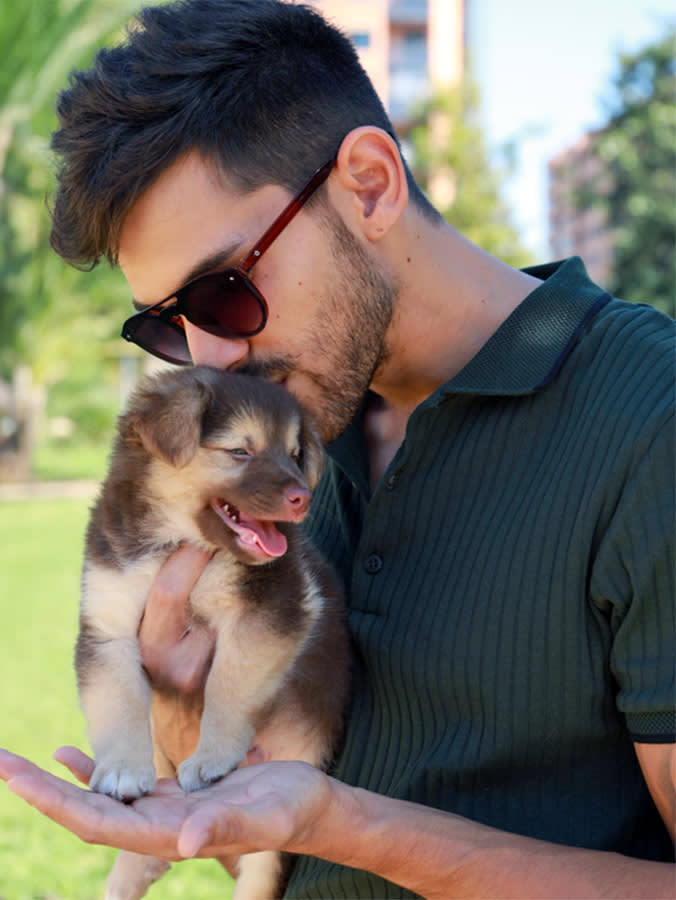
Share Article
In This Article:
What Is Rabies? How Do Dogs Get Rabies? Rabies Shot for Dogs Rabies Shot Schedule Rabies Shot Side Effects in Dogs Frequently Asked Questions
Generally, veterinarians recommend starting the rabies vaccination series around 12 to 16 weeks of age. It's crucial to consult with a veterinarian for personalized guidance and to ensure compliance with local vaccination laws.
What is rabies?
Everyone has a picture of what rabies looks like in their head. It could be a drooling, wild-looking dog like Cujo, a person deathly afraid to drink water, or a raccoon wandering the street during the day. But what causes people and animals with rabies to act so strangely?
Rabies is caused by the rabies virus, which can affect all mammals. The virus travels to the brain and can cause a number of different symptoms, depending on the stage of the disease. Symptoms of rabies in dogs include:
Behavioral changes
Progressive paralysis
Facial asymmetry
Difficulty swallowing (resulting in drooling/foaming)
Decreased appetite
Aggression
Coma
Death
Dogs are moderately susceptible to the virus and are one of the major sources of human rabies infections worldwide. Fortunately, public health programs that keep packs of roaming dogs in check and require rabies vaccination for pets have made dog-to-human rabies transmission very uncommon in more developed regions of the world. Keeping your dog up to date on their rabies shots helps keep them and, by extension, your community and family safe.
How do dogs get rabies?
Dogs can get rabies through contact with a rabid animal. This exposure to the virus most commonly occurs due to interactions with wild animals such as:
Bats
Foxes
Raccoons
Skunks
Rabies infection usually happens via a bite from an infected animal. Although less common, the virus can also spread through contact with an infected animal's saliva or nervous tissue, entering the dog’s body through its mucous membranes (like the gums) or an open wound. After an unvaccinated animal is bitten, the virus travels up their nerves at a rate of about one centimeter per day. Once the virus reaches the brain or spinal cord, it moves much more quickly, causing a uniformly fatal encephalitis within days.
Puppies are not naturally immune to rabies, but they do receive a few weeks of protection if their mother was vaccinated. These maternal antibodies provide temporary protection from the virus but cannot be relied upon to keep them safe for long.
Rabies shot for dogs
Fortunately, rabies vaccines for dogs are widely available and generally affordable. It’s vital to keep your dog up to date on their rabies (and other) vaccinations so that they’re protected from potentially deadly diseases and don’t pose a danger to other dogs and people.
Keeping your dog current on their rabies vaccine can also help prevent headaches for you if they get into a scuffle with another animal. Unvaccinated dogs with unknown bite wounds often need to be quarantined for months to make sure they’re not infected with rabies, while vaccinated dogs usually just need a booster and to be watched for a couple of weeks.
Where can you get rabies shots for dogs?
The best way to get a rabies shot for your dog is to go to your veterinarian. Rabies vaccination is part of the general preventative care your vet provides for your dog. This care also includes other vaccinations, deworming, microchipping, blood work monitoring, regular examinations, heartworm preventative s, flea and tick medications, and spaying/neutering and is aimed at avoiding health problems for your pup.
If you aren’t able to see a veterinarian for scheduled routine care, there are still options to keep your dog protected from rabies. Some common alternatives to full veterinary care are:
Vaccine drives at a local animal shelter or school
Vaccine clinics at pet stores
Mobile vaccine clinics
Pet community health practices (often at veterinary colleges)
These options can be convenient for pet parents that need a lower cost or less time-consuming option to keep their dogs healthy. These types of vaccination-focused events help provide coverage for everyone in the community and may offer other preventative care in addition to rabies vaccination.
How much does a rabies shot for dogs cost?
The cost of a rabies vaccine varies from region to region and clinic to clinic. Having pet insurance may be able to help with some of your annual preventative care costs, but it’s important to research your options fully. Some pet policies only cover major health events and leave the routine care up to you.
If you’re in need of a low-cost option for a rabies shot for your dog, the best bet is to contact your local animal shelter. Some cities are able to provide rabies vaccination at no cost, while others will charge a nominal fee ($5 to $10) to have your dog vaccinated. You can also check the local news for pet vaccination drives. These can be a great way to get your dog vaccinated without breaking the bank.
Rabies shot schedule
Your puppy’s first rabies shot will be part of their puppy vaccine series. It’s easy to get confused by what’s going on during the first months of your puppy’s life when they’re visiting the vet every three to four weeks for fecal exams, deworming, vaccinations, and progress assessments.
Fortunately, your vet can help guide you on what care is appropriate for your puppy at each check-up and may even have a handout for you so you can keep track of what’s expected week to week.
At what age do puppies get the rabies shot?
Rabies vaccines for dogs are approved for use starting at three months of age. The shot is timed to be given as soon as the puppy’s immune system is mature enough to react to the vaccine and develop antibodies against the virus. The goal is to minimize the period between the decline of protective antibodies from mom and the development of the puppy’s own protection.
Your veterinarian will likely recommend an age for your puppy’s rabies shot that is as close to 12 weeks old as possible. When a rabies shot is given to a puppy also depends on the timing of other vaccines, your puppy’s health status, and local laws.
How often do dogs need rabies shots?
Rabies vaccinations are required by law in most areas of the United States, and different states have different regulations for how frequently repeated shots are needed. Generally speaking, puppies should receive their first rabies shot between 12 and 16 weeks of age. To achieve lasting immunity, they should be vaccinated again for rabies within a year.
Rabies vaccines are approved for either a one-year or three-year duration. Even if your dog gets a three-year shot, your state or community may require vaccination more frequently than that. Your veterinarian will be familiar with local laws and keep track of when your dog’s next shot is required.
Rabies shot side effects in dogs
If you’re worried about the possible side effects of a rabies shot for your dog, you can be assured that rabies vaccines are very safe overall. Side effects to rabies vaccines are possible, but uncommon. A study in 2023 looked at how frequently dogs had adverse reactions to vaccines. The researchers examined the records of over 4.5 million dogs in over 16 million office visits over a five-year period. About 25 out of every 10,000 dogs receiving a rabies vaccine had an adverse event.
The side effects of a rabies shot in dogs are caused by the reaction of the immune system to the vaccine. This most commonly includes symptoms like:
Soreness (commonly at the vaccine site)
Fever
Hives
Itchiness
Lethargy
Local swelling or masses
Some dogs can have an unexpectedly severe reaction to a vaccination. These types of anaphylactic reactions happen very soon (usually minutes) after the vaccine is given and are the reason your vet will have your dog hang around for a few minutes after getting their shots. The symptoms of anaphylaxis include:
Weakness
Pale gums
Vomiting
Diarrhea
Collapse
High heart rate
Low blood pressure
Always alert a veterinarian as soon as possible if you are concerned that your dog is having a reaction to a vaccine. Even if it’s not a serious problem, your veterinarian can report the symptoms to the FDA and vaccine manufacturer to help keep track of possible problems.
FAQs (People also ask):
What vaccines does my puppy need?
The core vaccines recommended for all puppiesopens in new tab are distemper, adenovirus, parvovirus, and parainfluenza (DAPP) and rabies. In some areas, additional vaccines against leptospirosis, Lyme disease, and kennel cough may be recommended.
Does my puppy need a flu shot?
Canine influenzaopens in new tab (dog flu) is a relatively new disease. There is a vaccine available for it, but it’s only recommended for dogs with a high risk for contracting the disease. Talk to your veterinarian to see if a flu vaccine is needed for your dog.
References:
At What Age Should We Vaccinate Puppies and Kittens Against Rabies?opens in new tab
Compendium of Animal Rabies Prevention and Control, 2016opens in new tab
Table of State Rabies Vaccination Laws for Companion Animalsopens in new tab
AAHA - Recommendations for Core and Noncore Canine Vaccinesopens in new tab
Adverse Events Diagnosed Within Three Days of Vaccine Administration in Dogsopens in new tab
Injection-Site Sarcoma in a Dog: Clinical and Pathological Findingsopens in new tab

Dr. Bartley Harrison, DVM
Dr. Bartley Harrison is a veterinarian with more than nineteen years of experience. He has worked in both large and small emergency and specialty veterinary practices, treating a variety of species; primary interests includes emergence medicine and critical care.
Related articles
![two small puppies play on a beach]()
Here’s Why You Need to Socialize Your Dog ASAP
Waiting until full vaccination to socialize can cause huge problems for your pup.
![Young man cuddling little white shih tzu puppy by the Atlantic Ocean.]()
9 Myths About Your Puppy—Busted By a Behaviorist
The internet has a lot to tell you about your new addition. Here’s what’s actually true.
![Golden retriever puppy upside down playing with a mans hands and attempting to play bite.]()
How to Train a Puppy Not to Bite
Those little razor teeth are no fun.
![pet lover concept with mini dog on woman leg. sitting in room at home]()
What’s the Deal, Mouthy Puppies? Why Bite Inhibition Matters
How to teach your pup to play nice.
![girl with blue hair starting puppy training with white dog]()
Puppy Training 101: How to Train a Puppy
You gotta start somewhere.

